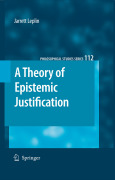
This book proposes an original theory of epistemic justification that offers a new way to relate justification to the epistemic goal of truth-conducive belief. The theory is based on a novel analysis of reliable belief-formation thatanswers classic objections to reliability theories in epistemology. The analysis generates a way of distinguishing justified belief from believing justifiedly, such that inerrant belief-formation need not be justificatory whereas systemic deception could be. It thereby respects the intuition that standards forjustification must be accessible to the believer, while maintaining the essential connection of justification to truth. The analysis shows how justification relates to, but is distinct from, evidence, rationality, and probability. Itprovides a unifying treatment of issues central to current debate in epistemology, including epistemic paradoxes, epistemic closure, skepticism, contextualism, virtue theories, the effect of luck on knowledge and justification. Proposes a new way to understand the difference between justified belief and opinion Is a new contribution to epistemology, addressing topics at the center of current debate Offers a new analysis of reliable belief-formation, with applications to epistemic closure, contextualism, skepticism, and virtue theories in epistemology INDICE: 1. Introduction.- 2. Truth-conduciveness.- 3. Reliability.- 4. Justification.- 5. Inference.- 6. Epistemic Paradox.- 7. Skepticism.- 8. Trackingand Epistemic Luck.- 9. Intellectual Virtue.- 10. Counterexamples.- 11. Intuition and Method.- Bibliography of Works Cited.- Index.
- ISBN: 978-1-4020-9566-5
- Editorial: Springer
- Encuadernacion: Cartoné
- Páginas: 230
- Fecha Publicación: 01/02/2009
- Nº Volúmenes: 1
- Idioma: Inglés
